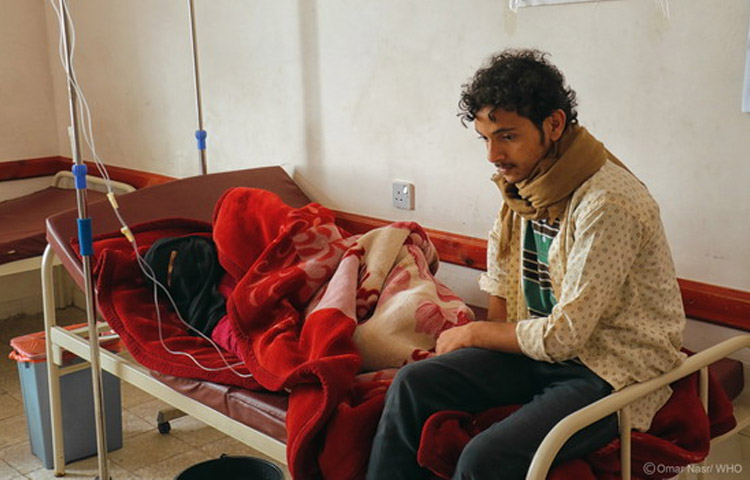
IMDAD Project
Behind the conflict in Yemen are the faces of millions of people—19.7 million people in need of healthcare. Each one of these men, women and children has a story to tell and challenges to overcome in order to survive. The world’s largest cholera outbreak swept across Yemen, infecting an estimated 1.3 million people. This, as well as other disease outbreaks, are the inevitable results of an ongoing conflict and a fragile health system on the brink of collapse.
WHO, Saudi Arabia and UAE Aid joined forces in the fight against this deadly yet preventable disease through the IMDAD project—scaling up the response in communities at the highest risk for cholera. IMDAD is an Arabic word that means “help and support”. This project aims at extending a humanitarian hand to protect the people of Yemen-- saving lives through control measures, as well as treatment of cholera.
WHO, Saudi Arabia and UAE Aid through the IMDAD project are running 146 diarrhoea treatment centres to get patients with cholera back on their feet and oral rehydration corners to make sure that people are able to receive early treatment and prevent dehydration if they have symptoms of cholera.
IMDAD is working in Yemen to ensure cholera patients are managed effectively, so the disease does not spread further, also proving medical and laboratory supplies in order for cases to be detected and identified early. The help and support of IMDAD has helped to contain and control the cholera outbreak in Yemen. This partnership has supported the strengthening of the cholera response. This lifeline support from IMDAD helps WHO remain vigilant in the fight against cholera.
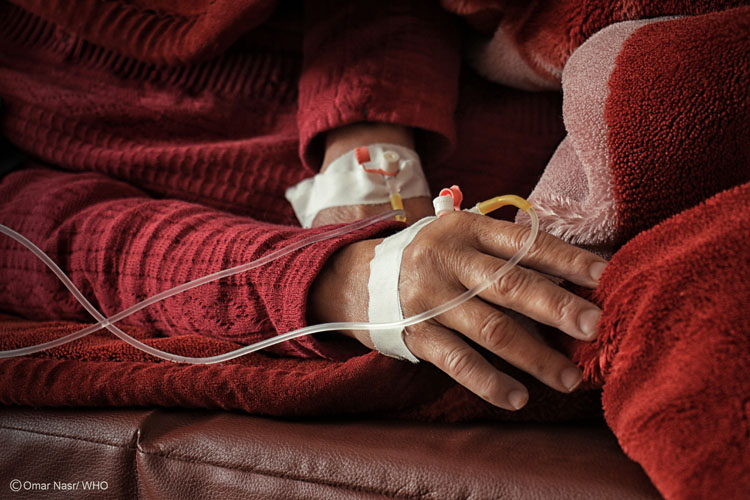
Mohammed
The war has taken a significant toll on the people of Yemen, who are in a constant struggle to survive. Mohammed and his family lost their home in Hudaydah governorate and found themselves in forced displacement to Aden. While searching for a second chance at life, Mohammed fell ill with cholera. “We no longer have homes and we risk losing our health as well. We struggle to provide the most basic necessities— my only hope now is to see my husband recovering,’’ said Mohammed’s wife.
In Al Sadaqa hospital in Aden governorate, lies Mohammed, 60 years old, displaced from the Hays district of Hudaydah governorate, both active frontlines. He received treatment at the diarrhoea treatment centre in Al Sadaqa hospital. The centre in Al Sadaqa hospital received around 705 cases in October and 139 cases in November 2019 and is supported through the IMDAD project.
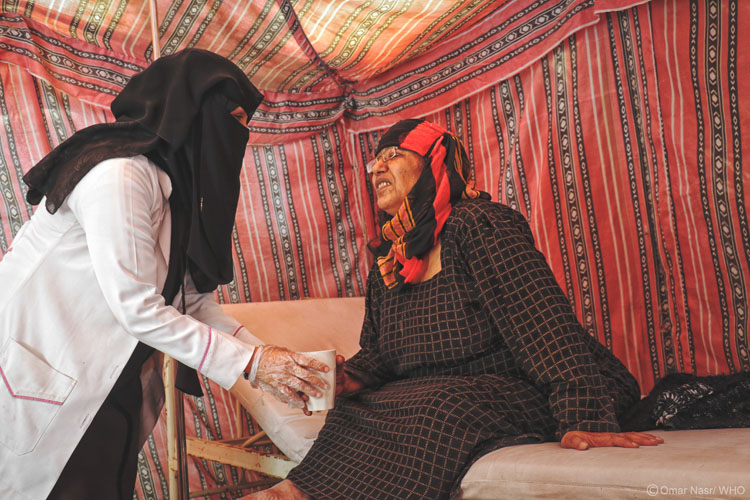
Ameera
Health workers, are the unsung heroes of the crisis. If not for them, hospitals would be forced to close, leaving patients without access to life saving healthcare. Ameera, is 32 years old and works at the Omar Al-Mukhtar diarrhoea treatment centre in Sana’a, providing health care since 2018. "We receive about 10 cholera cases per day from Sana’a, Raimah, Amran and Hajjah governorates.” said Ameera. “The incentives that we receive have been a blessing. I am now able to support my father to pay the rent and other living expenses, she adds.
Health care workers across Yemen work long hours without being paid, WHO, in partnership with Saudi Arabia and UAE Aid, supports 4607 health workers in diarrhea treatment centres and oral rehydration corners with incentives. “Without the incentives we would have been left with nothing. We are grateful,.” Ameera concluded.

Ali
In Yemen, cholera, which is a preventable disease, can be a death sentence. In late 2016, the world’s largest cholera epidemic swept Yemen, with more than 1.3 million suspected cases of cholera recorded so far.
Ali, 56 years old, was praying for his brother’s survival from cholera when he himself was infected. Ali and his brother received treatment at WHO-supported diarrhea treatment centre in Al Sadaqa hospital in Aden.
“Before being admitted here for cholera, my brother was also admitted two weeks ago for the same reason. I’m hoping that I will recover like him,” said Ali.
WHO and its partners are working tirelessly through the IMDAD project to make sure that cholera cases are managed effectively, so the disease does not spread further, also proving medical and laboratory supplies so cases are detected and identified early enough to save lives.
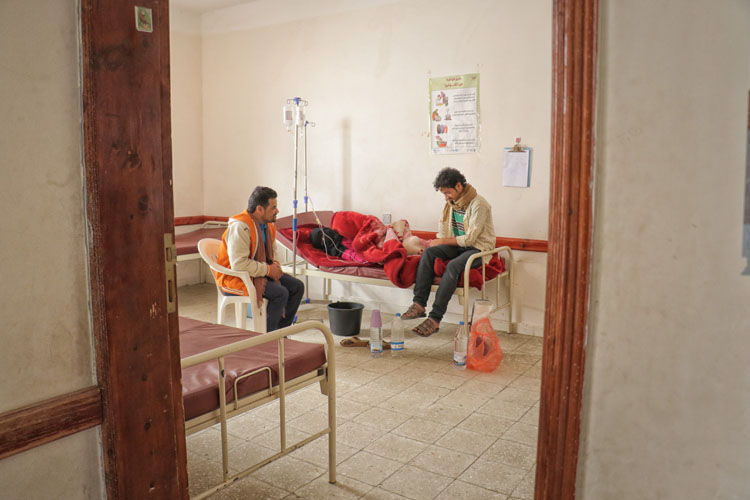
Zain
Millions of Yemenis have been struggling since the start of what is now known as the largest humanitarian crisis globally. The economic collapse has led to a critical deficit in the public budget which has disrupted the payment of public sector salaries. Yet, there are people who choose to beat the odds and serve the community. Zain, 26 years old, works at the Omar Al Muktar diarrheoa treatment centre as a health educator. “I work to deliver information and awareness sessions to patients about cholera prevention. I hope that this effort among the large-scale efforts help end the epidemic," said Zain.
Zain has been working as a health educator since 2018, he works to raise people’s awareness on hygiene, cholera symptoms and how to avoid being infected. “The response to cholera requires the coordinated response efforts that include health education as one of essential interventions to cholera prevention and control. The responsibility is huge and I have dedicated myself to this response so I could serve and support my community”. Zain is among nearly 4607 health workers supported with incentives, “In addition to my desire to serve my community, these incentives have allowed me to serve and support my family as well.”

Mariam
Almost five years of conflict have left the country in tatters, with millions and millions joining the list of those suffering; nearly 24.1 million are in need of humanitarian assistance. In a health centre called the 26th September, 50-year-old Mariam fought for her life, as cholera and heart disease ravaged her body.
Mariam was rushed to the health centre after suffering from severe watery diarrhoea, dehydration and hypertension. “She was shaking uncontrollably, and I was terrified of losing her, especially as she has heart disease,” said Waheed, Mariam’s young son.
Two days have passed since Mariam was hospitalized, now she is under treatment for cholera. “I presumed that my mother had cholera. I was infected myself two years ago, so I can identify the symptoms, this is why I rushed her to the same health centre where I was treated,” Waheed added.

Muna
Muna’s innocent and beautiful face turned pale after being infected with cholera, and her little body became frail. “The time it took us to reach the hospital felt like ages. Muna was vomiting nonstop. I thought I might lose her, and that thought was unbearable.,” said Muna’s mother. Muna is 2 years old from Aden governorate. She received treatment at a WHO-supported diarrhea treatment centre. ‘’She was really weak but after being admitted last week, her health improved. I am relieved that my baby is recovering,” she adds. The IMDAD project has helped to control the cholera outbreak in Yemen and save the lives of many children like Muna.
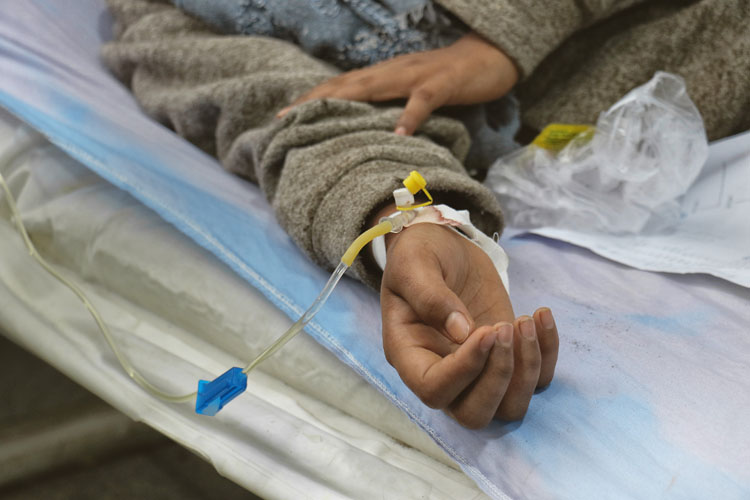
Yahya
Yahya is 30 years old. He lives in Amran with his wife and two children. Yahya works in a pharmacy located in one of the diarrhoea treatment centres in Yemen and never imagined that he would be infected with cholera, the disease that he provides medication for. “I was severely sick for two days. I never thought that I would suffer from cholera myself,” says Yahya. He lost a significant amount of fluids and was provided with intravenous infusions and oral rehydration solution. “After being treated, I appreciated working at the pharmacy even more. Especially the fact that I was part of alleviating the suffering of people with cholera," he adds.








